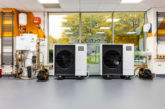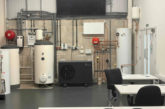
Can the UK achieve net zero? Not without more heat pump installers – says Vishavjeet Sodhi, Head of Air Solutions, LG Business Solutions.
Heating and plumbing engineers have a vital role to play in the UK’s journey to net zero – which means their skills are likely to be in high demand in the future. The Government is aiming to decarbonise all sectors of the economy by 2050 and push forward the replacement of old, inefficient boilers with greener, cheaper-to-run heat pumps.
The heating of Britain’s 28 million homes currently generates almost one-fifth (18%) of the nation’s greenhouse gases. As it moves to cut carbon emissions to zero, the government wants to see up to 1.6 million pumps installed annually by 2035. It’s an ambitious goal. To achieve it, we need to train up more heat pump installers – fast.
Highly efficient
Heat pumps are considerably more efficient than traditional heating systems. Most top-performing boilers are between 90% and 94% efficient. Heat pumps are up to 400% efficient, producing 4kWh heat output for every 1kWh of electricity supplied – cutting the cost of keeping a home warm (or cool) by up to 75%.
This cost-saving is of considerable benefit to consumers and businesses during times of rising prices and energy insecurity. Once installed, heat pumps can be extremely reliable and will pay for themselves as the savings accumulate. Many customers can also take advantage of government-backed funding programmes such as the Boiler Upgrade Scheme, which issues grants to replace conventional boilers with greener alternatives.
Lower emissions
Pumps produce between 35 and 65% lower CO2 emissions than gas boilers, according to the European Heat Pump Association (EHPA). In the EU, fuel pumps have contributed to a reduction of nine million tons of CO2 emissions. When a heat pump is powered by renewable energy such as solar or wind energy, its annual CO2 emissions can drop close to zero.
Heat pumps enable people to become less reliant on fossil fuels, save money, and adopt an eco-conscious approach to heating their home. We expect more and more consumers to upgrade from old, expensive and environmentally unfriendly boilers as the benefits become clearer – posing a potential workforce issue that needs to be addressed as quickly as possible.
Installer shortage
As we prepare for an acceleration in demand and adoption, one major issue is looming on the horizon. Britain is currently facing what the innovation charity Nesta has described as a “massive shortage” of qualified heat pump engineers, with just 3,000 serving the UK currently. Another 27,000 are required by 2028 to achieve the government’s heat pump installation target.
This shortfall is an opportunity for both existing engineers and ambitious people looking to undergo rigorous training to become qualified to install heat pumps. If the UK is to achieve its goal of net zero by 2050, government and industry will need to accelerate the adoption of heat pumps by creating a workforce with the skills needed to decarbonise domestic heating.
A future-proof workforce
To avoid a heat pump crunch, both industry and government must collaborate to ensure enough engineers are being trained in the installation and specification of heat pumps. This requires the upskilling of existing installer partners as well as apprenticeships to help new engineers join the workforce with the future-proof skills needed to roll out these sustainable technologies.
Industry academies have an important role to play. For example, the LG Business Solutions Air Conditioning & Heat Pump Academy provides training in the troubleshooting and maintenance of heat pumps. After completing their course, trainees have the qualifications they need to specify products correctly. They also have certifications to fit and maintain systems built by other manufacturers.
When the industry takes the lead on training, it not only increases the pool of skilled professionals capable of installing and repairing pumps – but reassures consumers who are worried about the reliability of heat pumps that support is available if they require it.
A sustainable career
Heat pumps are a key part of the net zero equation and there is a clear opportunity for stakeholders at every level. Companies will benefit from selling and installing more heat pumps. Individuals who gain the training needed to fit and maintain pumps will earn themselves an attractive and sustainable career. The government will be able to work towards achieving its net zero ambitions.
There is work to be done. Building a skilled workforce is not an easy task and it cannot be postponed. But through improved apprenticeship schemes and industry support there is an opportunity to train the engineers needed for tomorrow. This will provide the chance to cut the UK’s emissions whilst creating greener jobs and a bright future for thousands of British people. Net zero can easily be a net gain for heating and plumbing installers.













